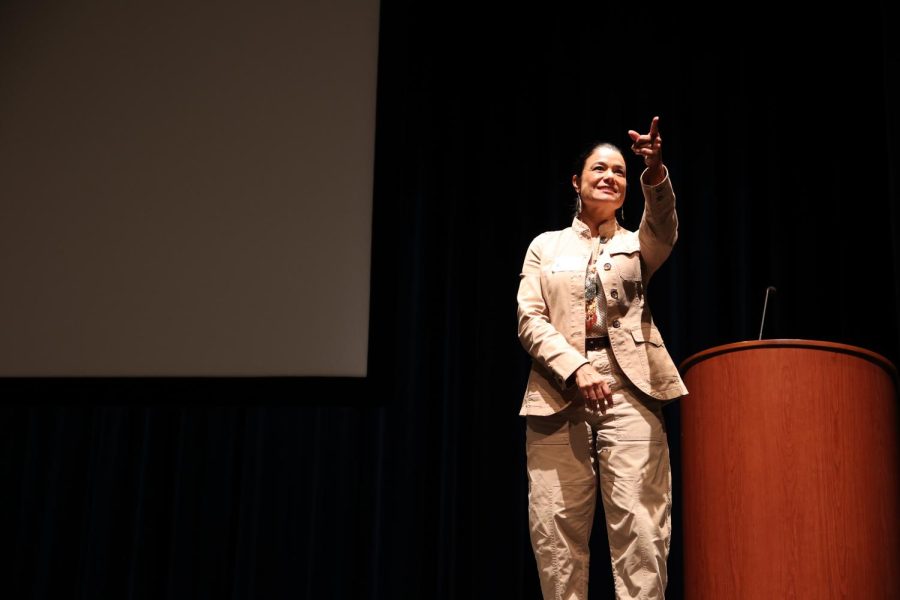Muwekma tribe’s chairwoman speaks about federal recognition
April 18, 2023
The Muwekma Ohlone tribe’s chairwoman is encouraging students and faculty to join the fight for Muwekma federal recognition according to comments made during her speech at Palo Alto High School in the Performing Arts Center on Friday.
During the event, Cherlene Njimeh covered the history of the tribe, her story and hardships, and the issue at hand: federal recognition for the Muwekma Ohlone.
She described how she came to be an activist after her mother’s violent encounter with an archeologist to prevent him from digging up ancestral remains.
“My mother tried to protect her people that day but she always regretted her actions,” Njimeh said. She would often tell me, ‘this is not who we are — we can’t let them make us so angry that we resort to violence.’”
In an effort to raise awareness about this issue of federal recognition, the Muwekma tribe hosted a postcard writing event from 1 p.m. to 3:30 p.m. on Sunday in the Media Arts Center in collaboration with the Social Justice Pathway program at Paly. SJP students have been learning about Native American history in their classes and are taking on projects to raise awareness about current Native American issues.
“In the Social Justice Pathway, we learned about design techniques this year and put that to use with these postcards,” Takumi Weimann, a junior in the pathway, said. “Every person in our cohort is taking an active role in planning a variety of events to show support for the tribe.”
Njimeh subsequently contextualized the fight for federal recognition. Still over the years, powerful companies like Apple have taken over the tribe’s indigenous homeland to house Apple’s large campus instead.
“Today, our Aboriginal lands are occupied by some of the wealthiest companies in human history and are considered the center of the universe when it comes to technology, innovation and wealth creation,” she said. “These companies generate immense wealth while occupying stolen unseeded molecular lands.”
Nijmeh explained how federal recognition would give the Muwekma Ohlone tribe of more than 600 members the right to self sovereignty and federal benefits.
“Federal recognition does not create tribes — it recognizes social-political communities that predate the United States,” she said. “It creates a trust relationship between the tribe and the federal government, which entitles tribes and their members to certain federal benefits but most importantly, it recognizes tribal sovereignty, including the Protection and Repatriation of their ancestral remains.”
In addition to tribal sovereignty, federal recognition would also allow the Muwekma to take ownership of their lands.
“We have the right to live on the land and practice cultural activities [on the land],” she said. “But we want to be able to own the land.”
Njimeh spoke to her audience about the legislative avenues that the tribe has been taking to fight for recognition. For instance, the tribe’s delegation met with congressional delegations and traveled to Washington D.C. to speak with representatives.
“The state senators are in full support of our sovereignty,” she said. “They even wrote a letter expressing their support for our recognition.”
“The government simply needs to correct their mistakes and restore our status either by administrative correction or Congress can pass a bill,” Njimeh said.
Njimeh called on students and faculty in the audience to take action as the fight for recognition has been in motion for the last 40 years.
“Of course, we know we exist,” Njimeh said. “But for some reason, the federal government needs to tell us we exist.”
Editors note: This updated version of this story makes clear that the push to pass Senate Joint Resolution 13, which would call for federal recognition, not establish it, was a past effort by the tribe not to be confused with the tribe’s current efforts. Anthro Magazine apologizes for not making this clear in the previous version.

